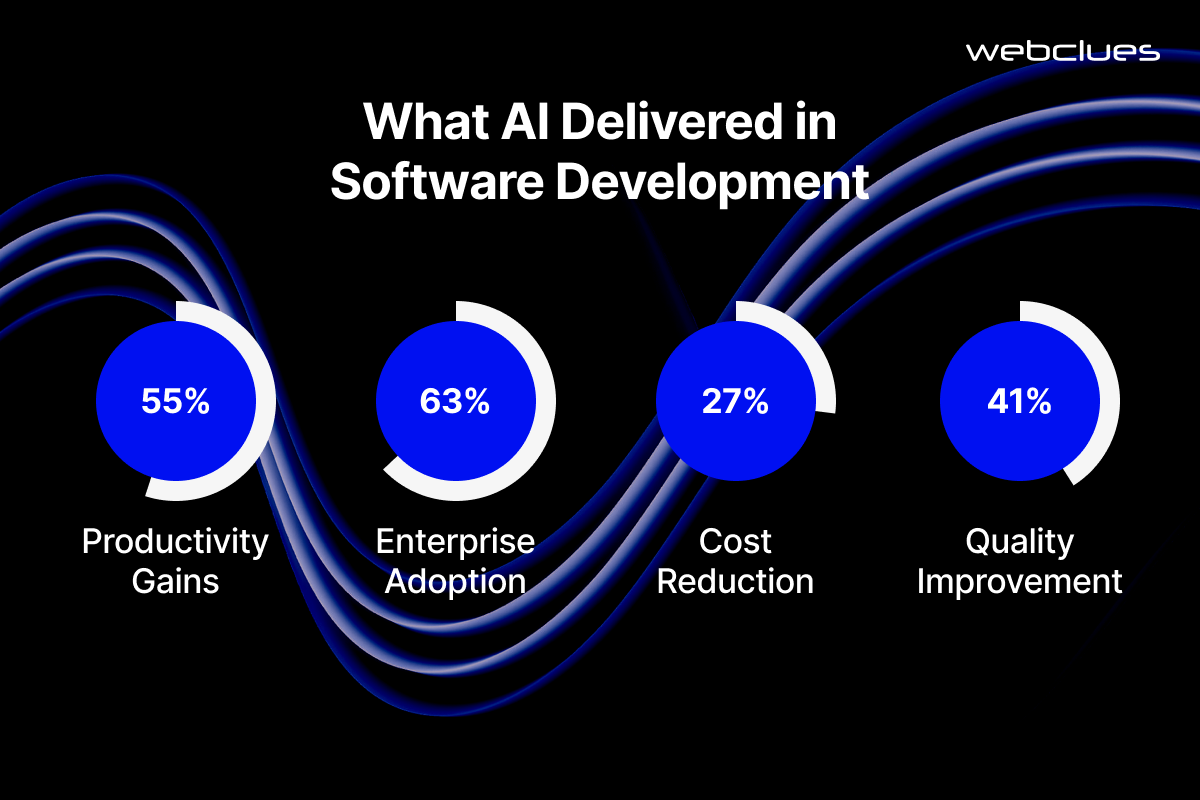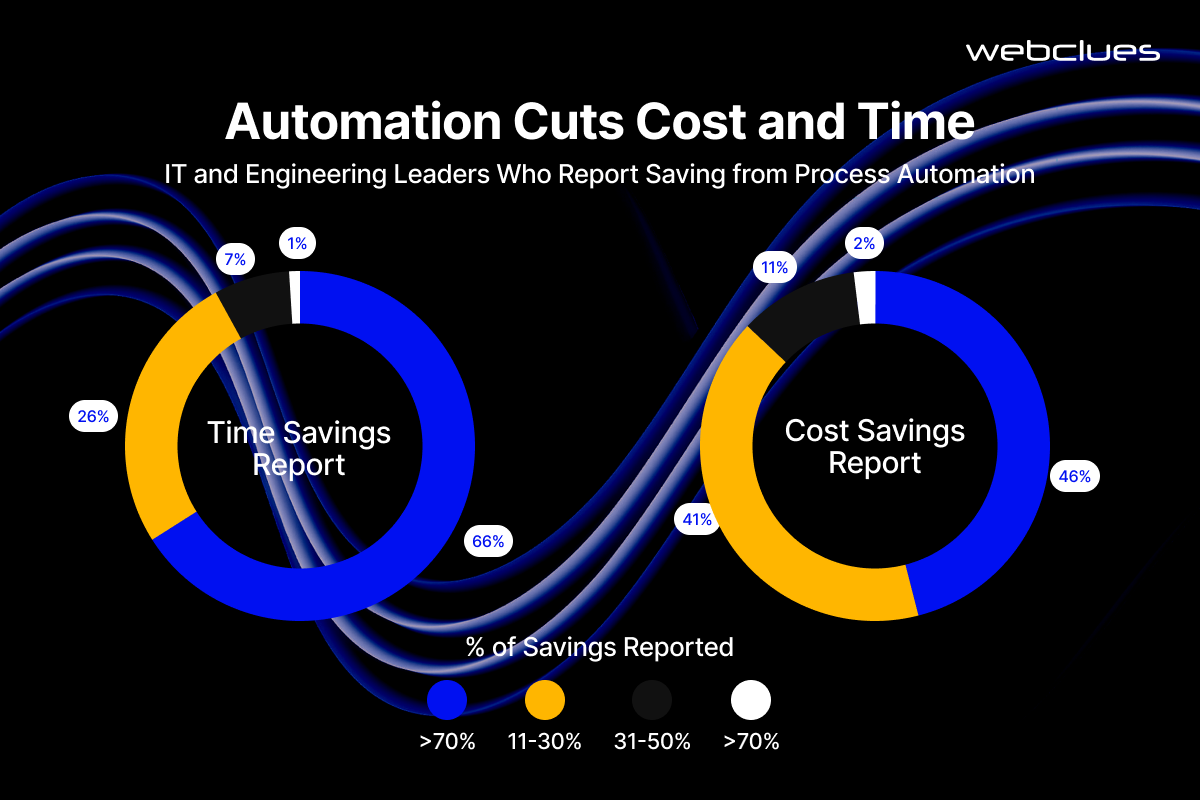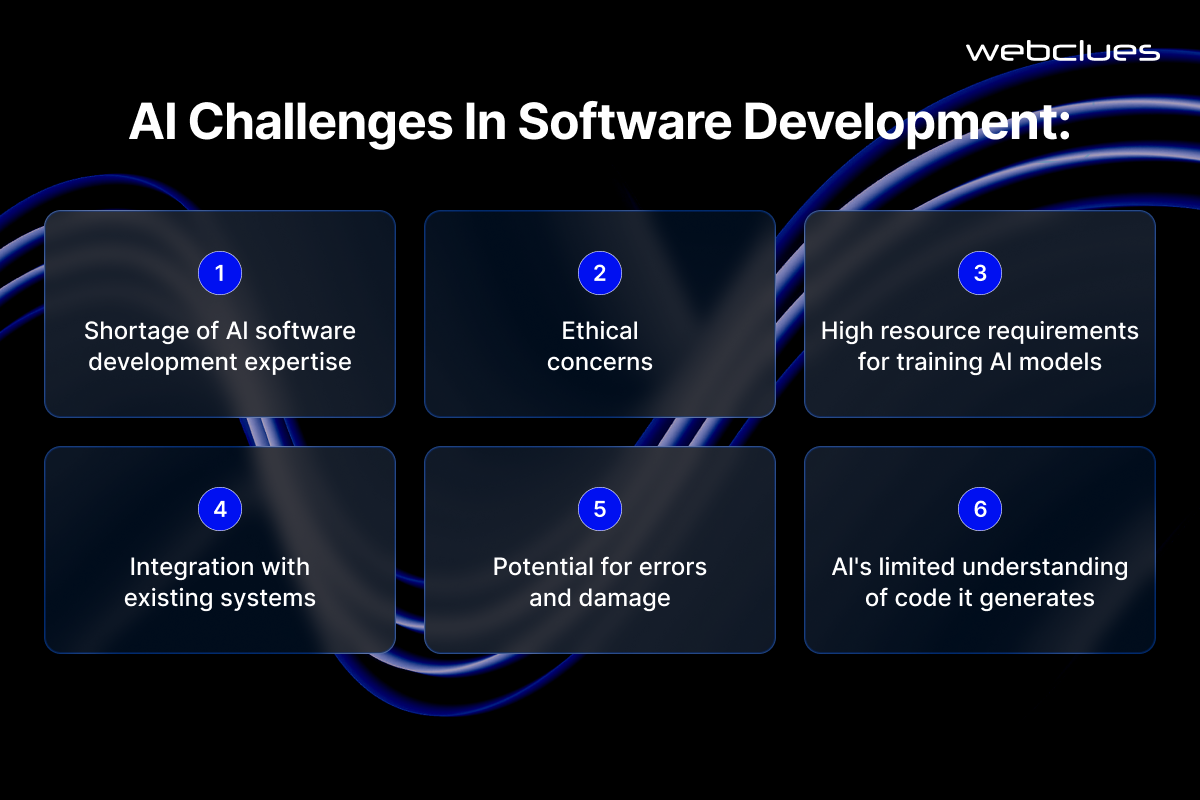AI in Software Development: Where It Saves You Time, Where It Doesn’t
.png)
AI in software development refers to the use of artificial intelligence tools and techniques to support or automate parts of the development process. From writing code to testing applications, AI is increasingly being used to reduce repetitive work and speed up delivery.
Over the last few years, many companies have started adopting what’s often called an AI-first approach. This means AI isn't just an add-on; it plays a central role in how their software teams plan, build, and maintain digital products. Whether it's startups trying to ship faster or enterprises optimizing development pipelines, AI has started influencing how decisions are made and how work gets done.

But while the promise is big, the reality is more nuanced. In this blog, we’ll look at where AI actually saves time in software development, and where it doesn’t. If you're working with or exploring an AI development company or considering using AI in your own team, this guide will help you make more informed choices.
Where AI Saves You Time in Development
Artificial intelligence has found its way into many parts of the development workflow. Some of the biggest time savings come from areas that are repetitive or structured, where AI tools can offer fast, reliable support.

Automating Repetitive Coding Tasks
One of the most visible applications of AI is in writing code. Tools like GitHub Copilot and Codeium are popular AI code assistants that suggest lines or blocks of code as you type. They’ve made it easier for developers to work faster by cutting down on the time spent writing syntax or boilerplate logic.
AI code generation tools can also help developers build components or templates more quickly. While the output still needs review, it’s often good enough to reduce the time spent on simple or repeated tasks. For teams working on tight timelines, this level of software development automation can be a real advantage.
Faster Debugging and Code Review
Debugging takes time. Even small issues can slow down a release if not caught early. This is where AI tools for software development have become helpful. Many platforms now offer static analysis or bug detection tools that scan code for issues as you write.
These tools can flag problems instantly, suggest fixes, and even explain what’s going wrong. That kind of AI-assisted development means developers can spend less time on manual review and more time improving the core logic of their applications.
Smarter Testing and DevOps
AI is also being used to improve how software is tested and deployed. Test case generation, for example, is now being handled by models trained to understand code structure and expected behavior. This speeds up the testing process and reduces the chance of missing edge cases.
In DevOps, AI helps optimize CI/CD pipelines. By learning from previous build data, it can predict failures, adjust deployment timing, and reduce unnecessary runs. This is where machine learning in software development blends directly into operations. The result is faster, more reliable deployments with fewer blockers.
Documentation and Code Summarization
Writing documentation has always been a time-consuming task, especially when the focus is on getting features out the door. AI-powered documentation tools now help generate summaries, explain code functions, and create basic documentation files from source code.
This is useful not just for developers, but for new team members who need to get up to speed. In companies offering AI development services, these tools help maintain better handoffs and improve cross-team understanding. It’s a small improvement that can save hours over the course of a project.
Where AI Still Doesn’t Save You Time (Yet)
While AI brings speed and efficiency to certain parts of the development process, it isn’t a complete solution. There are still areas where human experience, context, and judgment play a critical role. In fact, relying too heavily on AI in the wrong places can lead to problems down the line.

Complex Problem Solving and Architecture
AI tools are good at handling patterns, but they don’t understand purpose or big-picture goals. Designing a software system from the ground up, deciding on architecture, defining service boundaries, or choosing the right tech stack still requires deep experience and domain knowledge.
These decisions often depend on business priorities, user behavior, scalability expectations, and many other factors that AI doesn’t fully grasp. This is one of the core limitations of AI in software development. Tools can support implementation, but they don’t replace the thinking behind it.
Security, Compliance & Ethical Considerations
Security and compliance are not just limited to writing secure code. Developers have to consider user privacy, regulatory rules, and data protection policies. AI-generated code, while fast and functional, may not account for all these layers.
In many cases, AI can produce code that appears efficient but doesn’t follow internal security protocols or industry standards. This creates risk, especially for companies operating in regulated sectors. Even firms offering AI software development services understand that final code review, ethical review, and compliance alignment need to be done by people. These are not tasks that can be handed over to AI without oversight.
Code Quality and Long-Term Maintenance
Even when AI generates code that works, it doesn’t always produce code that’s readable, scalable, or easy to maintain. It may take shortcuts or overlook future use cases, which creates technical debt over time.
Teams that use generative AI in programming often find that the initial speed boost is offset by extra time spent fixing or rewriting that code later. AI-assisted coding should be seen as a support tool, not a replacement for thoughtful development. Clean architecture, naming conventions, and clear logic still come from experienced developers who understand both the code and the people maintaining it in the future.
Not There Yet but Getting Closer
It’s worth noting that many of the gaps we see today, like architectural reasoning or ethical awareness, are already being explored through ongoing research and improved tools. While current systems fall short in these areas, progress is being made.
Some of what AI cannot handle today may become partially automatable over time. But as of now, these tasks still depend on sound judgment, real-world experience, and direct human involvement.
Real-World Use Cases from AI-First Teams
Small Teams Building Faster with AI
For many development teams, AI has moved beyond experimentation and become part of their daily workflow. It’s not about replacing developers, but about helping them move faster and focus on more important work. Small teams, in particular, have seen real gains in productivity by relying on the right AI tools at the right stages.
One clear example is how solo developers or small startups now use AI code assistants to build early prototypes in a fraction of the time. Tasks that once took days, like setting up boilerplate code or writing unit tests, are now completed in hours. These early wins can make a big difference when time-to-market is tight.
How AI Tools Are Being Used in Production
Some popular platforms also show how AI can support real production use. Tools like Replit and Codeium have enabled leaner teams to build more with less, especially when backed by clear product goals and strong review practices. The speed comes not just from AI itself, but from how these teams design their workflows around it.
The WebClues Approach to AI-First Development
At WebClues, our AI-first development teams follow a similar approach. We use AI-driven code suggestions, testing tools, and documentation assistants to cut down delivery cycles without cutting corners. This allows us to build and ship faster, while keeping our focus on quality and long-term maintainability.
For businesses looking to move quickly without expanding their team size, working with an AI development company that already understands these tools can make all the difference. Whether you're building something new or scaling an existing product, it may be the right time to hire AI developers who can bring this level of speed and efficiency to your project.
Is an AI-First Development Approach Right for Your Project
AI-first development isn’t a trend. It’s a shift in how modern software is being built. But like any shift, it’s important to understand where it fits and where it doesn’t. The right approach depends on your project goals, timelines, and how much adaptability your product demands.
When AI-First Makes a Clear Difference
For projects that require speed, lean teams, and fast iteration, AI-first methods can offer serious advantages. This includes MVPs, prototypes, internal tools, or automation-heavy applications where structure is predictable and experimentation is part of the plan.
By automating low-level code, generating test cases, and summarizing documentation, AI helps reduce cycle times without lowering the bar on output. If your goal is to launch faster, learn from real users, and refine as you go, an AI-first team can make that path smoother.
When You May Want a More Balanced Model
Projects tied to critical infrastructure, financial compliance, or healthcare regulations often demand more traditional oversight. AI can still play a role, but a purely AI-first setup may not suit the depth of human judgment needed in such environments.
In these cases, a hybrid approach tends to work better. AI handles the repeatable tasks while experienced developers take charge of security, architecture, and review. This model offers efficiency without skipping over areas that require a deeper sense of control.
What It Means in Practice
Choosing an AI-first approach is not about cutting corners or replacing people. It’s about giving your team a head start. The time savings come from offloading predictable work, not the work that makes your product unique.
At WebClues, we’ve shaped our process around this idea. We bring AI into the parts of development that benefit from speed while keeping human insight where it counts. That way, you get working software faster without compromising on long-term thinking.
Whether you’re exploring AI development services or planning to hire AI developers for your next build, understanding how and where AI fits is the first step. The rest is execution.
Final Thoughts on AI in Development
AI brings real efficiency to software development, especially when used with clear intent. It can speed up coding, automate testing, improve documentation, and make lean teams more productive. These are measurable gains, and many teams are already seeing the benefits.
But it's also important to know where the limits are. Complex decisions, security, and long-term maintainability still depend on people who understand context and can think beyond the immediate task. AI is powerful, but it works best when it supports (not replaces) the experience and judgment of a strong development team.
For businesses thinking about how to move faster and stay competitive, AI in software development is worth exploring. The key is to treat it as a tool for automation, not a shortcut for critical thinking. With the right balance, it can improve how software is built without losing sight of what makes it last.
Build Your Agile Team
Hire Skilled Developer From Us
Harness AI in software development to reduce delivery cycles while maintaining code quality and stability.
From early-stage prototypes to production-ready platforms, WebClues integrates AI into the development process to accelerate delivery and improve consistency. Start your AI-enhanced software development journey with confidence.
Book Free Consultation!Our Recent Blogs
Sharing knowledge helps us grow, stay motivated and stay on-track with frontier technological and design concepts. Developers and business innovators, customers and employees - our events are all about you.





